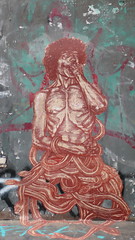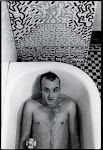
Ok, so regular for us is we do a two-man job, there's the neck-man as we call em, and a truck-man. I've got seniority so lately I've been the neck-man. Neck-man does the shooting, so it's easier on me cause of my age. We use a little .22 to give em quick pop to the back of the neck, to make sure they're dead, then the truck-man, that's been Steve, lately, but if he's not around Will L.'ll do it, though he's down to part-time these days, on account of his wife's condition.
Then the truck-man, no mystery there, he haul's em up into the truck. If it's somethin' on the bigger side like a deer I'll pitch in a hand a'course, but if it's rodents or coons he'll handle em on his own, and I act in a, more in a supervisory capacity. If it's real plain the thing's dead we don't bother shootin, we just do it if it's squirmin or callin. We don't much like to handle em if they're still kickin.
Got started this way cause a this raccoon a'thought was dead, so I grabbed him by the tail, and he swings's head up at me, all nasty and crunched up half of it, snarling but weak though, faint more like weezin than snarlin. But it was a good scare still, so I tossed him back down and shoveled him once, but I don't like shovelin. Shootin's better, and more reliable, cleaner; the shovel sends all that head matter flying, brains and what else.
See, you don't want to take a chance with something the size of a deer, if it hops up and starts kickin at you you'd be bruised up or worse in no time. Deer are responsible for dozens I'd say if not hundreds of injuries every year. The half-dead ones'll be fiercest of the bunch, ready to fight for their lives.
So in any case, like I say, it's just a little, me and Will L. worked up, it's got sort of a rhythm to it, back a the neck, back a the truck, it works real smooth, keeps things rollin, and it lets for an older one like me to keep on, just triggerin stead a haulin, passin on what I know.
Now Will L.—now we call him that cause we need to clarify him from Will Howard—now Will L., he seen the raccoon that almost nabbed me, and seen me shovel it, and I have to say, heard me complain about it, and got sick of hearing me complain about it, and so it was him suggested the .22 to keep me from havin to shovel. And with the pistol I can make sure from a ways a way, not close and breathin the same air, getting snarled at. And I don't say this to cast blame around—not to say it's his fault, or anything like that—I say it just as a point of factuality, to give you a more fully painted understanding of the normal procedures, of what we normally do, so you can understand what happened.
Anyhow, that should answer your question about why we have the firearm, and what we usually do with it. Most days it's real easy, like I said, neck and truck, easy, quick, done, machine-like, our own little version of efficiency and division a labor, and all that kind of thing, makes it all much easier.
So now on the day in question it was raining, and I mean hard, and I know that was established already what with what Jackey said, but it was real hard, and I feel the need to say it again, cause he just talked on the rain and the floodin, and I don't mean to say nothing bad about what he said, it was all right, and I'm not the type to nitpick and correct another man, but he didn't talk on the clouds, just the rain, but the clouds makin that rain they were dark, I mean fierce dark, like they'd malice in'em, the very wrath of God Himself, and they blocked out the light, every scrap of it. But that don't mean we could'a quit, no, meant we had all the more reason to get out there. The rain just soaks em, makes em heavier and faster-rottin. If we don't clear'em quick it'll only be worse for us later, so we headed straight on out.
But you see those clouds, they're the crux here, that darkness they made, it was real, and the rain they made, it was tough and burrowy, digging down into things grub-like.
So there we was, couldn't see and couldn't barely grab a hold a nothin, pistol was slip'ry as Hell in these old hands, and when I'd grasped a fix on it, and was sure and steady, I gave that furry thing a pop right bout where the neck ought to be. It looked like a deer, with its neck cracked over, and its head tucked under the body. So I shot it where it looked like the bend in the neck was, and then Will L. he came past me to start grabbin it up while I put the pistol back in the dash. When I walked back over to Will L. I saw he was standing a ways off with his hands on his hips and when he sees me he just says "John…John this ain't right." I remember him saying my name twice, don't ask m why I remember that. He had started to move it, and now I was closer I could see a ear stickin out of that great big furry mess of a coat. That's when Will L. phoned the Sheriff. I felt weak on my legs and went and leaned against the side of the truck.
So that's what happened, that's the whole lot of it, from top to bottom, start to finish. It was the darkness, and it was an accident, an honest mistake, what else could it be?
Now the coroner says it was my shot that did it but I say no. How could he be sure of a thing like that? I say it was all over and done before we showed up, but like I said it was dark, plenty, and raining cats, but I know I didn't see no movement, not with the dark and not under that coat, so I just can't be sure, no sir, can't be sure a nothin, not in this life. But it was an accident, I'm sure of that. What else could it be?
Tobias Amadon Bengelsdorf has been reading up a storm, most notably at Quickies! Chicago and Powell's North. His fiction is available at elimae, and audio work at Lark(!). He was also accidentally in a play in Chicago, where he lives.
Photo by Adam Lawrence
Image by Gaia

No comments:
Post a Comment